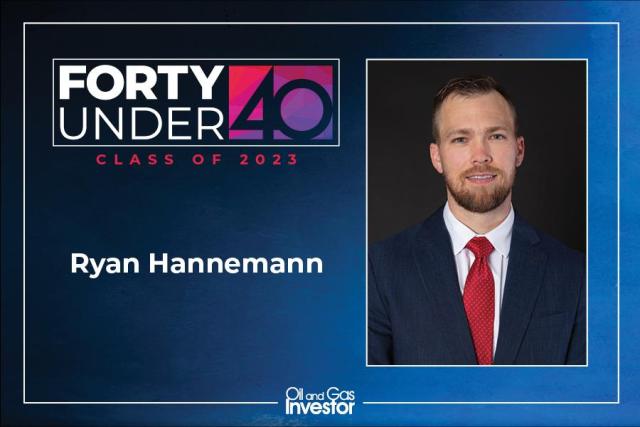
Presented by:

Ryan Hannemann is one of three brothers, all of whom are combat veterans of the U.S. Army. “I joined the oil and gas industry because I was captivated by the challenge that unconventional oil and gas presented,” he says. “The prospect of discovering, accessing and economically producing hydrocarbons from incredibly tight and highly variable petroleum systems, buried miles beneath the surface, felt both daunting and promising.”
Which career milestone did you reach sooner than you had expected?
Surpassing my own expectations, I achieved the milestone of becoming subsurface manager for the Bakken in just five years, a feat I hadn’t anticipated. This accelerated growth was made possible through a combination of factors, including what I consider a lucky run-in with some of the best leaders I’ve seen; invaluable guidance from mentors; having a diverse background, including the experiences from prior service; and a willingness to make personal sacrifices for continuous development.”
Describe a memorable professional experience.
“Amidst the unprecedented COVID pandemic, I transitioned from an A&D-focused role covering North Dakota and Oklahoma to managing subsurface and production specifically for Oklahoma, a region hit hard by negative oil prices. The remarkable aspect was witnessing the team’s exceptional maturity and focus despite the challenges. The tough conditions seemed to galvanize us, fostering resilience and determination to bounce back. Ultimately, the team’s tenacity led to impressive outcomes, highlighting their ability to capitalize on opportunities even in the most trying circumstances.”
What qualities do you think are necessary to be a good leader in the oil and gas industry?
“To excel as a leader in the oil and gas industry, several qualities are crucial. A good leader should be able to think strategically and adapt non-linear approaches to problem-solving. Effective communication, combined with active listening, fosters strong team collaboration and trust-building. Leading with empathy, while inspiring and challenging the team, creates an environment where individuals aspire to excel. This involves allowing flexibility in achieving the mission to adapt to the team’s strengths and capabilities. Additionally, a successful leader invests in grooming and growing talent, offering mentorship and providing space for team members to develop and thrive.”
What advice would you give other young professionals?
“For young professionals, my advice is to pursue what truly excites you and to seek out mentors and peers who challenge and inspire your growth. Listen intently, learn from every experience and don’t be afraid to take calculated risks. Remember, your journey is about embracing opportunities, learning from failures and crafting your unique path to success.”
What transformations do you think the industry must undertake for it to thrive in the future?
For the industry to thrive in the future, we must continue to adapt on several levels and improve with the changing times. This includes harnessing AI and innovative technologies to increase efficiency, drive down costs, optimize operations and minimize environmental impacts. From a financial perspective, the industry needs to make disciplined decisions and engage in sustainable behaviors that balance near-term priorities and long-term prosperity. Additionally, fostering a culture of transparency, sustainability and community engagement will be paramount in reshaping the industry's reputation and emphasizing the true value we contribute. By aligning these changes, we can create a more prosperous and balanced future for both the industry and the communities we serve.

Recommended Reading
Kimmeridge Fast Forwards on SilverBow with Takeover Bid
2024-03-13 - Investment firm Kimmeridge Energy Management, which first asked for additional SilverBow Resources board seats, has followed up with a buyout offer. A deal would make a nearly 1 Bcfe/d Eagle Ford pureplay.
M4E Lithium Closes Funding for Brazilian Lithium Exploration
2024-03-15 - M4E’s financing package includes an equity investment, a royalty purchase and an option for a strategic offtake agreement.
Laredo Oil Subsidiary, Erehwon Enter Into Drilling Agreement with Texakoma
2024-03-14 - The agreement with Lustre Oil and Erehwon Oil & Gas would allow Texakoma to participate in the development of 7,375 net acres of mineral rights in Valley County, Montana.
California Resources Corp. Nominates Christian Kendall to Board of Directors
2024-03-21 - California Resources Corp. has nominated Christian Kendall, former president and CEO of Denbury, to serve on its board.
Uinta Basin: 50% More Oil for Twice the Proppant
2024-03-06 - The higher-intensity completions are costing an average of 35% fewer dollars spent per barrel of oil equivalent of output, Crescent Energy told investors and analysts on March 5.





